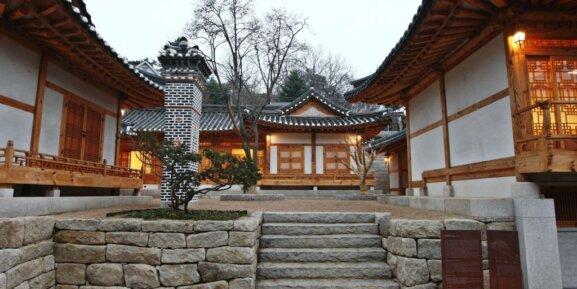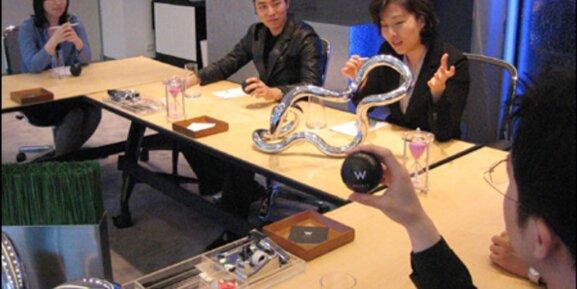Chaebol Life – A Different Take on Work-Life Balance
If you are looking for an ‘in-a-nutshell’ summary of the difference between Korean work culture and that of most Western businesses then a recent exchange with one of my corporate students couldn’t make it much clearer.
I asked him if he had any plans for the New Year Holiday and he told me he was going to climb a mountain which sounded fine. He then went on to explain that all of the senior management team at his company were going to be climbing together to watch the sunrise. I can imagine the reaction of someone back home being asked to get up at 4am on New Year’s Day to climb a mountain with his manager and colleagues. Two words. The second one would be ‘off’. In Korea though, this was business as usual, just part of chaebol life.
For those who don’t know, the chaebols are the huge conglomerates that dominate the Korean economy – Samsung, LG, Hyundai and the like. These huge corporations generally have their hand in just about everything that you can imagine – from construction to finance, from consumer electronics to oil refining and from shipbuilding to chewing gum. Although most are actually shareholder-owned the founding families generally still run the businesses and, as such, exert a huge amount of influence not just on how their own companies are run but in many aspects of Korean life. When these guys aren’t obsessing over how to serve macadamia nuts, they tend to have the ear of senior politicians and play what many might consider too much of a role in determining how the country is run.

As an outsider looking in, life as a chaebol salaryman (or woman) seemed to be fairly unappealing. Long hours, very little autonomy, working in rigid organisational structures where the boss is the king and forced socialising with your colleagues till late at night just to have to get up tomorrow and do it all again seemed more like a life of indentured servitude than a career path. Not that it seemed to make them less appealing to the average Korean. Working for one of the chaebols is still the dream of most Korean graduates – as an indication of their popularity (and the extreme competition faced in getting in) one of my students informed me that this year they had received 100,000 applications from graduates to work in their company. There were only 100 places available.
So what is it that makes these 1000/1 shots so attractive? When I first arrived in Korea I could never quite understand it. However, recently I have had more of an insight into life at the chaebols and I think I am starting to get it…at least slightly.

Yes, the long hours, strict hierarchy and early morning hill walks on your day off are certainly all there. And don’t expect too much time off for vacation or too many sick days. You are expected to give up a lot. But you also get a lot in return and I’m not just talking about salary. You get to work with some very sharp people in companies that are generally at, or close to, the forefront of their industries. You get opportunity. Not just to rise up the ranks, but also to work overseas, to learn new skills or to further your education. How many companies in the West are willing to provide hundreds of hours of expensive language training to their employees every year? How many will send junior employees on long-term international assignments to gain experience? How many are willing to sponsor students to complete Masters Degrees, MBAs and PhDs overseas? How many will send a manager on a year-long ‘sabbatical’ overseas to do something entirely unrelated to their day job while still getting their full salary? I’ve seen examples of all of these here in Korea in the space of just a couple of months.
Even the day to day office experience is a relatively pampered one compared to some of the places I have worked elsewhere in Korea and back home. Their offices tend to be the biggest and best, in the nicest locations, and rather plush. Every mod-con is generally provided also. In-house coffee shops and fitness centres are almost ubiquitous while I’ve even seen a few offices with shopping centres, restaurants, art galleries and childcare facilities provided. When I think back to grabbing a soggy sandwich from a truck parked outside the factory back home I can start to see why chaebol life might appeal.
In contrast to many parts of the West, where job hopping is becoming increasingly common, there is still an expectation also that chaebols will provide a job for life (although this is perhaps something that is changing in very recent times) and they inspire great loyalty in the people who work for them. So much so in fact that, when Samsung announced a plan to sell off some parts of their business to rival Hanwha, transferring workers erupted in protest at the thought of moving.

Back home, the Holy Grail of business culture was achieving the proper ‘Work-Life Balance’ – in other words, your work was separate from your life (family, friends, interests, etc) and you had to manage trade-offs between the two to keep them in balance. Here in Korea, it seems the distinction is much less clear – work is life and life is work. Your job and your colleagues are every bit as much ‘family’ as your spouse and children. And as with any family, you have obligations and responsibilities as well as rewards.

Seen in that light, at least to me, the business culture in Korea makes a bit more sense. I think it also helps to explain some of the cultural differences which I, and others, experience when working here – after all, you would never raise the question of a contract with your mother, or ask your sister for overtime payments if she wanted you to do her a favour, would you? Things that perhaps we might see as ‘just business’ have an added personal and emotional element that, let’s say, makes things interesting.
I don’t think I’m quite ready to give up my days off and weekends for work but, if nothing else, I think getting a glimpse of the chaebols from the inside has given me a different perspective on Korean working life and culture. I’m still not getting up at the crack of dawn to climb a mountain with my boss though! Some cultural gaps are just too wide.
https://www.youtube.com/watch?v=t275D0EHRAM


